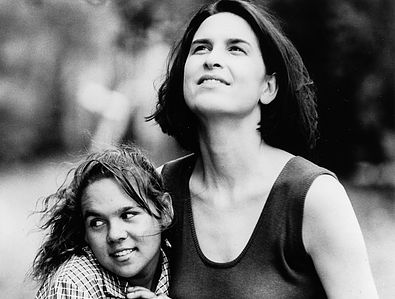Following the death of her mother Tessa (Pamela Rabe), a young woman, returns after many years to the weather-beaten family home on the shores of Sydney’s Botany Bay. But the old family home begins to bring old wounds more and more to life. The story unfolds through flashbacks yet as it progresses the flashbacks merge into the present as it becomes apparent that the situation Tessa has returned to is very much the result of that which passed before. This is a film about memory – personal and collective. To quote the director: ‘the story of a house, land and two families – one white, one Aboriginal – both living in the shadow of the past’. The deliberately ambiguous title could refer to the house itself, but also the history of White Australia (see Terra nullius).
Curator’s notes
The film is clever in the way it seamlessly mixes the different time periods together, suggesting how Tessa’s consciousness is drifting in and out of the past. Her father is estranged, rather than dead, so we are initially unsure if it really is him in the kitchen. The mother, seen at the end of the scene, is dead, which makes it clearer that this is an imaginary moment. In a sense, Tessa’s delusions connect her more directly with her father, who clearly suffered a post-traumamtic reaction after the war. Tessa is grieving for her mother and her own baby, lost when she was 16. That’s the part she doesn’t tell Millie, who reminds her of that lost daughter. The baby’s father, also now dead, was Mitch, Millie’s uncle. The white family and the Aboriginal family are thus entwined, through history, grievance, blood and death. That’s one of the film’s underlying pillars – that the races are not separate in Australia.
Source: aso.gov.au
Interview: TV Week Magazine (01 June 1996)
Recently seen in ABC series The Bite and Mercury, she has won critical praise for her roles in the new Australian films Cosi and Vacant Possession. She has also begun filming a role in Paradise Road, a World War 2 drama starring Glenn Close and Jennifer Ehle. The Film, set in a Japanese prisoner-of-war-camp, is tipped to be controversial. Insiders say its portrayal of the way women were treated in such camps brutally honest.
Pamela plays a Canadian prisoner “with a chip on her shoulder”, and she hopes the project will not lead political or social tension.
“It will be interesting to see how the subject matter is handled, because extraordinary things happen in war,” she says.
“Whenever you dredge up issues like this, some people would rather those memories not be tampered with. But I don’t see the film as an undue, two-dimensional depiction of the Japanese – it’s a story that will focus on the women’s experiences. “It’s a three-dimensional film. It’s not just “baddie” Japanese versus beautiful, blue-eyed women.”
Unpretentious, Pamela is not motivated by a need for public recognition. Her main concern is the opportunity to play roles of artistic and intellectual merit.
From this point of view, she feels “blessed”, she says. “But I have no delusions. It’s like a roller-coaster. There will be ups and downs, and right now I’m riding along and happily hopng that the downtime doesn’t arrive too soon,” she says.
Pamela, married to Melbourne Theatre Company director Roger Hodgman, is immensely proud of her association with Vacant Possession in which she plays and emotionally scarred woman who returns from an overseas trip to confront her past. She arrives in Sydney to deal with the death of her mother, but must also contemplate her relationship with her alcoholic, violent father, the rivalry with her sister and her teenage pregnancy to an Aboriginal boy whose family still lives down the street.
The story is rich in symbolism, illustrated by the snape draped around Pamela’s neck.
Asked if she was comfortable with a reptile slithering around her body, a light-hearted Pamela says: “I had to be! It was actually a wonderful experience. I just didn’t realise how sensual they are on bare skin. You feel every muscle in their body massively as they move around.”
– Darren Devlyn
95 minute drama from Wintertime Films and As If Productions
Directed by Margot Nash
Written by Margot Nash
Produced by John Winter
Starring Pamela Rabe, John Stanton, Toni Scanlon, Lynden Wilkinson, Olivia Patton, Melissa Ipploito

Theatrical release: 1996 Sydney, Melbourne, Perth, London
Cairns, Noosa, Darwin, Adelaide, Hobart
Broadcast: SBS Australia Day 2001; NAIDOC week July 2001
“Often brilliantly directed – with superb cinematography from Academy Award winner Dion Beebe and a compellingly atmospheric sound track ”Vacant Possession” is a truly exciting piece of cinema…” – Adrian Martin, The Age.
1998 Audience Award: La Mo-Viola Cinema Delle Donna – Torino, Italy.
1996 Speciale Mention du Jury: Films Des Femmes Créteil, France.
AFI Nomination Best Director
AFI Nomination Best Original Screenplay
AFI NominationBest Editing,
AFI NominationBest Sound
1995 Voted most popular Australian film Sydney Film Festival.